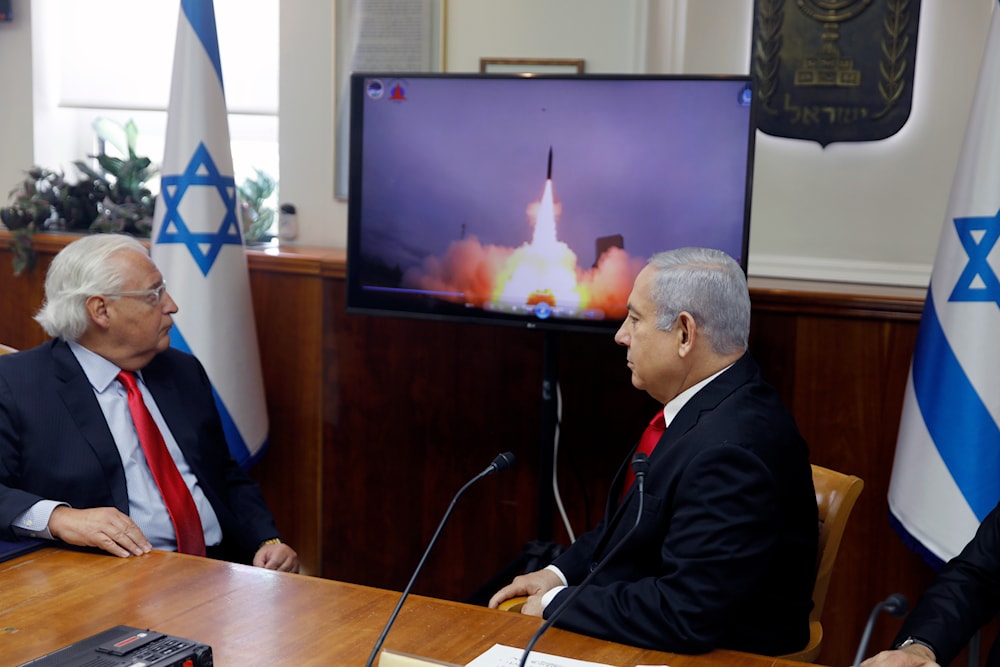Iran strike interception cost is more than $1.2 billion: Reports
The Israeli occupation might have downed a large number of Iranian projectiles in Sunday's attack, but that came at a very steep price of billions of dollars as Tehran spent mere millions.
-

Israeli Prime Minister Benjamin Netanyahu and US Ambassador to 'Israel' David Friedman watch a video showing the launch of the Arrow 3 hypersonic anti-ballistic missile during a cabinet meeting in al-Quds, occupied Palestine (AP)
The Iranian attack on the Israeli occupation proved to be highly costly for the latter, with the National Security Research Institute revealing that it cost the Israeli occupation a hefty 4.5 billion shekels ($1.2 billion) to intercept drones and missiles launched by Tehran, and that did not even allow them to down all of the projectiles, Israeli Channel 13 correspondent Matan Hodorov said on Monday.
The air defense munitions used to intercept the Iranian projectiles cost some 8% of the Israeli occupation's security budgets before the start of the war on Gaza. However, it is worth noting that these figures include work carried out outside of "Israel", which is currently funded by the United States and other foreign actors and not necessarily by the Israeli treasury.
The Israeli journalist provided a breakdown of the costs of the interceptions, explaining that the drones intercepted using fighter jets cost upward of $500,000 per missile per drone, the ballistic missiles intercepted with Arrow 2 and Arrow 3 air defense systems cost $2-3 million per missile, while the interceptors of the Patriot and David's Sling air defense systems cost upwards of $700,000-$1 million.
The Israeli analyst also underlined that to those massive figures must be added the fuel used in the interception, as well as the cost of mobilization and operation of the fighter jets, as well as the disruption of Israeli facilities, which essentially brought the economy to a grinding halt for several hours.
"The economic issue for the Iranians is that such an attack costs much less, some say a tenth of the cost of defense, which increases the fear that more missiles will be launched in the future," Hodorov added.
"Military [officials and analysts] think it is a reason to increase the security budget even more, and economic experts] fear [Israel] being drawn into an economic war of attrition if there are more such rounds," he said.
Going on to boldly describe what went on as a "victory", he underlined that it had many drawbacks, saying that while it was impressive, it was very costly.
'Israel' needed help to stop Iranian attack
What the Israeli journalist said goes hand-in-hand with a WSJ report that underlined that the Israeli occupation could not have bore the Iranian attack were it not for foreign aid and intervention.
Western media outlets have been reporting over the past day that Iran's retaliation did not inflict much damage on "Israel", and although the occupation has a long-established policy of greatly underreporting the damage it suffers, as part of its propaganda campaign to appear as a fortress, The Wall Street Journal reported Sunday that the "successful" deterrence of Iran's attack goes back to the assistance "Israel" was provided by the United States and allied Arab states.
"American, British, and Jordanian warplanes played an especially important role in downing drones," WSJ said, underlining that the majority of Iran's drones and missiles were destroyed before reaching Israeli airspace due to the assistance it received.
It is noteworthy that the attack launched by Iran was far from a surprise attack, and begs the question of whether "Israel" and its allies can replicate their performance during the Iranian operation in the case of an all-out war, and whether "Israel" would be able to stand strong against Iran - and most likely its allies - by itself without any assistance.
"Israel" is before a tough crossroads, according to WSJ: It must attack Iran once again, otherwise it risks eroding its deterrence, and anything short of an attack on Iranian soil would also have the same effect, exposing the Israeli occupation to more attacks by Iran, but at the same time, the occupying entity cannot sustain another large-scale Iranian attack if Iran chooses to retaliate - and it is likely to go with that option in light of its shift from a passive to an active stance in the region in the face of the Israeli occupation's violations.
"Iran [...] has now become exposed to a direct attack from Israel," former Israeli government analyst Nadav Pollak said. "Going forward, Israel is not going to be able to sit quietly and intercept everything."
The Israeli occupation's inability to counter the retaliation is due not only to it not having a sufficient quantity of air defenses in the case of an all-out war, but also to the fact that the air defenses they use, including the Arrow and Patriot anti-air systems, are extremely expensive, with little quantities in store. This comes amid ongoing deliberations in Congress that have postponed when the Israeli occupation would receive its munitions, as the US cannot agree on a military aid package that bundles together "Israel", Ukraine, and Taiwan.
The Israeli and Arab air defense systems were overwhelmed with an attack that is only a fraction of Iran's actual missile and drone capabilities, which could easily not just overwhelm, but bypass the existing air defenses.

 5 Min Read
5 Min Read








